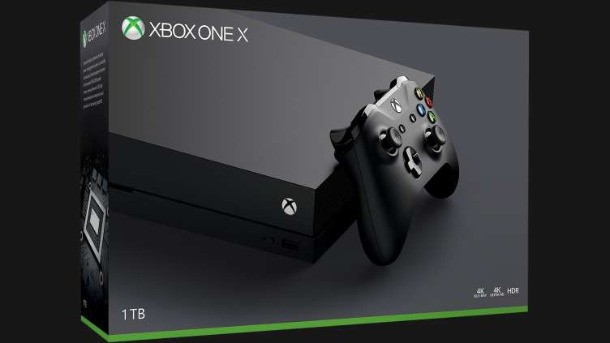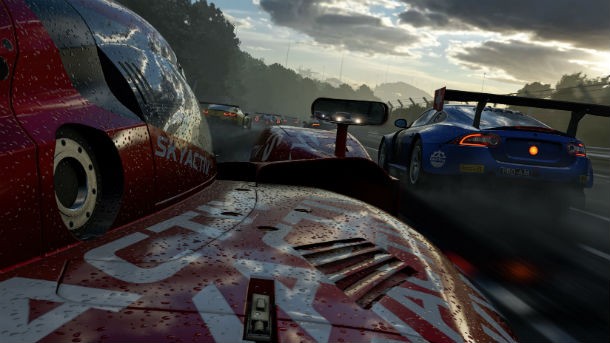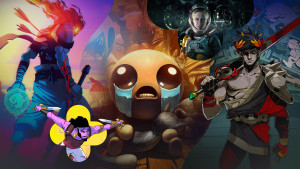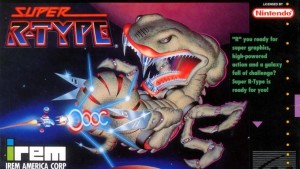Please support Game Informer. Print magazine subscriptions are less than $2 per issue
Microsoft Explains Who Exactly The Xbox One X Is For

The Xbox One X is touted by Microsoft as the "most powerful console ever," and rightfully so. With tons of power, the system cuts down on load times and has the potential to display games in native 4K with HDR visuals. However, $500 is a steep price to pay for a new model of the same console if you already shelled out that much for the Xbox One when it launched. Despite this, Microsoft has reported strong pre-order numbers for its new model that launches on Tuesday, November 7.
With Microsoft on the brink of launching the third model of its current gaming system, I spoke with Xbox One marketing lead Albert Penello about the impending launch, how Microsoft is courting developers to enhance their games, and what mid-generation console upgrades mean for the industry.
The Xbox One X seems to target the most hardcore of Xbox players, who have likely already spent $500 on an Xbox One when it came out several years ago. How do you hammer home that this is worth spending another $500 to get this better experience?
There's a couple assumptions in your question that I think we should break down. The nice thing about the what we're doing with this mid-cycle console upgrade is that a lot of the traditional console generation rules don't apply. Typically, when this happens, you're like, "Okay, here's why I need to convince everyone they need to move from an Xbox 360 to an Xbox One, or an original Xbox to a 360 because that one's going away and this is the new one." That doesn't really apply this time, so it kind of changes the conversation you have with customers, I think. We can basically say that as long as you buy an Xbox, we're cool! I don't feel the need to really go prove why you should upgrade because if the inherent value isn't there for you and you're not someone who cares about visuals and 4K, that's totally cool. That's okay. I also don't think the value proposition of X is relegated to hardcore gamers. I think we have seen in Xbox history that when we do premium products, they always do really well. They always surprise us. I'll use the [Xbox One] Elite Controller as an example of something that we did that we thought was going to have a very small market, and it wildly exceeded our expectations. So I don't like to segment the Xbox One X and S as "hardcore" and "casual" because I think it's about performance and what matters to you than how much you game. There are really people who just really love tech and they're getting a new 4K TV and they want to be able to show off that 4K TV, and that doesn't necessarily have anything to do with how much they game.
Would a better way to phrase it rather than "hardcore" be "people who want to wring out the most of the performance out of their gaming system"?
Oh yeah, certainly. If we're talking about the guys who care about performance, then we're talking about how we want to offer the console that plays the best version of the game. Now it's sort of the reviewers' hands and the fans to validate that assumption. I believe that you're going to see that the best versions of games will be on Xbox One X, and we built the box to be able to do that. Those guys will figure out if the value is in it for them. What I love is that all the games work, the stuff that you have is better on X even if it hasn't been upgraded. On my S, I can actually see if I have Xbox One X-enhanced games or not, so I can look at my own library and say, "Wow! Half of my own library is already ready to go!" That helps in this equation.
I also think that customers today are used to their devices being upgraded more rapidly, as long as their apps and their contacts, all of their software works, which is why we've put such a huge emphasis on compatibility and making sure all of the accessories and all of the games are seamlessly compatible between the two systems.

I'm assuming what you're referencing there is how smartphone cycles have changed how we think about technology as a whole. How did that influence Microsoft's approach to releasing multiple systems across one generation and all the software working across the various models?
It's interesting because I like to use the smartphone model in some cases, but certainly there's downsides to the annualized model as well. There was a lot of indicators that we looked at. We saw 4K TVs and we liked that – that's important for people internally to look at the tech and believe in it – you see the wide color gamut, you see HDR, you see 4K and you're like, "Okay, this is really beautiful. There's something here." That was one observation.
The second was you go talk to TV manufacturers and you ask them, "What do you think is going to happen?" and they're very bullish. You look at analyst predictions and you see how TVs are going to migrate and that 4K is going to be there. You look at PC game developers and how rapidly they embraced 4K textures and 4K assets on PC. The game content is there. Then you look at customer behavior and smartphones and PCs, which have had a resurgence in the past 5 or 10 years with people upgrading their video cards, and you realize that consoles are kind of the last technology that makes you wait, like, a decade between bumps.
So you look at all of those things and you start asking, "What's the best way to do this for gaming, for gamers, and for this industry?" Because you want to kind of pick the best, most logical parts of those observations.
That was what was fun about this process: sort of asking ourselves those questions. "What's the right way to do this in a way that's better for gamers and better for developers that gets us all the energy of a console launch, but doesn't have the business disruption and customer disruption that typically comes with them?" That informed a lot of the product that we built.
This is a mid-generation console upgrade, so it's not a completely new console, but at the same time, you're launching a new console. I think it's fair to say that several of the games Xbox was hoping to have in its exclusive stable have been pushed out or outright canceled. What challenges does that present to not have a large stable of exclusives to launch within the same window as the Xbox One X?
I would definitely say that there is more stuff to play than there is time to play it. When you look at all the games that are coming out from both first- and third-party, we've got PUBG, we've got Forza Motorsport, and I know it doesn't track for the core gamer, but at this point in the lifecycle, games like Super Lucky's Tale and the Disney games have a place because that customer is about ready to move off their 360 and consider a new console, so those are important titles even though they aren't as visible... games like Cuphead. The exclusive stable is good; cross-platform stable is great. Then we've got OG back-compat, 360 back-compat, we've got Gamepass. There is more content to consume than there is time to consume it. From a content perspective, I feel great.
Specific to Xbox One X, this is where I get to say that this is where it doesn't behave like a console generation because... I use the joke that when Nvidia launches the 1080 Ti, nobody says, "Where are the exclusive games for the 1080 Ti?" The old games that they had just get better because they have more GPU. Since I'm not trying to ask people to leave Xbox One S and move to Xbox One X, I don't think there needs to be an exclusive Xbox One X title to do that. We've got 160 Xbox One X-enhanced games that have been announced. Depending on who's numbers you believe, there's going to be somewhere between 50 and 70 titles that take advantage of the box in the first week or two of launch. Typically, a new console gets somewhere between 18 and 22 games; we're going to have 50 to 70. Even on that metric, we're going to have more content that takes advantage of Xbox One X than any console launch ever.
I feel really good and I think it's a testament to our developers and our partners who supported us, and the effort and energy that the team put in to make this a great development platform and making it easy to do that. I think the content for Xbox One X is really remarkable, even by a console generational standard.

With the Xbox One X serving the role as a mid-generation upgrade, should anyone have any concerns that an even better Xbox One system could release in the next couple of years after they throw down $500 for this? The tech cycles are speeding up.
That's why we have to make a promise around compatibility and really demonstrate that we care about the games. These are all optional. You're right and it's funny, because I've commented before that when you launch a new console, the first question you get asked is, "When's the next console?" The commitment that we're talking to customers about with things like Play Anywhere and going back to the original Xbox compatibility is that, yeah, the technology cycles do move faster, and the real investment that people make in the long-term is the game library and in Xbox Live and in their Gamerscore and in their controllers and the guys buying these Killer Instinct fighting controllers and things like that. Having that kind of compatibility is important.
I don't think we're going to get into an annualized console cycle – I don't think I could personally survive trying to launch a new console every year [laughs]. I don't think it's healthy for the industry. I do think you'll see more rapid innovation, but that's going to be up to customers to kind of tell us what the right time is. Then, what I think we really want to say is, "Hey, we're making a huge investment in game compatibility." We're trying to prove that out by going back and doing upgrades to 360 titles and bringing original games, making sure we have 100% compatibility between S and X. That investment you make with Xbox content is something that we're really going to care about going forward.
How are you working to court more developers to further enhance their games using the power of the Xbox One X?
We announced Project Scorpio at E3 2016, and people were surprised that we announced an Xbox One S at the beginning of the show, then a new console at the end of the show. We actually had two new consoles that we were doing, because on top of Xbox One X, we had our development kit, which was designed to be the world's greatest development kit. The numbers, the specs of the console, when you talk about six teraflops and 12 gigs of GDR5 memory... all those performance specs, those are there for a reason.
What was really interesting about the development of Xbox One X is that in typical console generations, you are just starting over; you have new specs and you're just throwing them out to the world and saying, "Please build the best games you can with these specs." In this case, we took the existing engines that we had and we ran hundreds of thousands of simulation runs specifically to figure out what it's going to take to get 4K and 4K textures with this engines running. Every number in the box was specifically designed to do exactly what we said it was going to do. That makes this a very interesting development from a hardware perspective. We made the box from the get-go to have the performance and to have the devkit to make it easy for developers to enhance their games, and I think that's one of the reasons why you're seeing so much support so quickly for a product that hasn't even launched yet.
We've seen other platform holders launch more powerful versions of their consoles or handhelds and certain games don't run as well on the original version. Do you think we'll see cases where a game is developed primarily for Xbox One X and the less powerful systems will suffer?
I don't see that as being a challenge that we're going to face. It wasn't how we designed the system. Games are going to run great on Xbox One S and they're going to run better on Xbox One X. This is a question I get a lot, and I also like to talk about modern game development, but also how we built the console. The Xbox One and Xbox One S are the same console in so many ways. It is just a more powerful version of the other console. Game developers these days are building their game engines inherently to be scalable. Even if you take consoles out of it, PCs have a far bigger scale from their bottom-end to their top-end than the Xbox One S to the Xbox One X. So modern game development already takes this performance scaling into consideration
You sort of don't hear this on PC, this idea that, "Oh, if I didn't have to run this on the Intel integrated graphics card that PC games would be so much better." It's very much the same way for the Xbox One S and the Xbox One X; they are the same console, the same tools, the same engine, the same development environment. Even with just a short development time – the Xbox One X development kits have only been out since E3 – we're already seeing the level of performance between the two because it's really easy to get your engines up and running. There's no holding back of Xbox One X because of Xbox One S; they are both the same console, the same platform, and they're both going to play the same games as long as we sell those consoles.

We've seen great commitment from Xbox in supporting the backward compatible initiatives. Are we going to see similar support in supporting Xbox One X enhancements?
I certainly hope so. Like I talked about, we really tried to make it easy for developers who are building these great, high-end assets on PC to have another platform to bring that to. The speed with which we've seen support has been outstanding, and my hope is that going forward every game is Xbox One X-enhanced. Ultimately, those are decisions that each developer and publisher are going to have to make. I'm very encouraged based on what we're seeing right now.
Some of the patches are just enormous to download the 4K or HDR enhancements. With the Xbox One X only having a 1 TB hard drive, rather than the 2 TB seen in some models of the Xbox One S, was there any concern internally that this might not be enough for these huge patches?
That's a great point. We're generally seeing that the 4K patches are bigger, but they're obviously not double or four times bigger. They're on average probably a third larger than the 1080p assets. We're doing a lot of what we call intelligent delivery to help that on both consoles. We have enabled a new set of tools for developers to allow them to segment the assets by console, and also things that take up a lot of space like language packs and stuff like that, which typically go down as one big download. We're making a lot of effort with developers to make downloads better.
I also have to remind myself and people in the industry that we have abnormally large content libraries relative to the average customer because of what we do. We definitely run into edge-cases that the typically customer won't run into.
The last thing is that I do encourage the external hard drive as something we've supported from the get-go. We've found that even when we had internal hard drive swap ability like on Xbox 360, that people don't really like to crack open their consoles. Having external hard drive support – and those are very affordable these days; there was just this 4 TB on sale for, like, $110 I think – is a great way to get a ton of storage.
I think we have a lot of options for people. Obviously, we're trying to solve it with the developers, we're trying to solve it for users, and we're trying to make it easy for people who do have huge libraries to expand their storage without have to get a new system or crack it open or anything like that.
Right now, you can search your library to see which games have Xbox One X enhancements. Is there going to be a way to search the store to see which games have those enhancements?
100%. Totally. You can search our store and the dotcom store – there are actually more filters there: You can filter by 4K, HDR, and Xbox One X-enhanced in the dotcom store. On your console, you can search by Xbox One X-enhanced. You can also do that on Xbox One S, by the way, so you can see which of your library is future compatible so you can make the decision of whether there is value in it for you.










